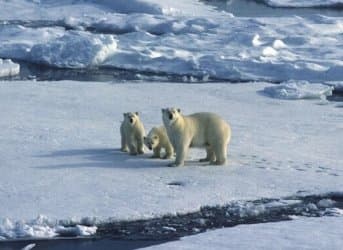Royal Dutch Shell announced Monday it was suspending parts of its arctic drilling campaign off the coast of Alaska. A forecast, however, suggests oil production from parts of the Alaskan arctic could grind to a halt in less than 15 years. Production from the North Slope, situated along the Beaufort Sea, peaked at 2 million barrels per day in 1988. By 2010, production had declined by 70 percent. Shell said it would next focus its campaign further north, but given apparent complexities there, it may be premature to expect any significant gains from the region in the near future.
Shell announced Monday that the containment dome for its oil-spill response system for arctic waters was damaged, forcing it to suspend some operations in Alaska. The supermajor said it was disappointed that the system hadn't met its standards for the arctic, but at the same time felt compelled to honour its commitment not to operate in the northern waters unless safety was ensured. Shell was already forced to scale back its ambitions in the Chukchi Sea last week because of the threat of encroaching ice. Damage to its containment dome prompted another look altogether.
"The time required to repair the dome, along with steps we have taken to protect local whaling operations and to ensure the safety of operations from ice floe movement, have led us to revise our plans for the 2012 - 2013 exploration program," the company said in a statement. "In order to lay a strong foundation for operations in 2013, we will forgo drilling into hydrocarbon zones this year."
(More from Oilprice.com: Qatar: Rich and Dangerous)
Shell added that it expects operations to begin in the Beaufort Sea in the coming days. The company's operations may be curbed further, however, by a lawsuit filed by the Center for Biological Diversity challenging the listing of marine mammals under the Endangered Species Act. Seal species, like polar bears, depend on ice floes to hunt and raise their young. With sea ice at its lowest levels in recorded history, changes in global weather patterns are starting to have ecosystem-wide impacts that extend beyond immediate concerns about energy plans. If it succeeds, the lawsuit could cut into Shell's ambitions further.
Longer periods of thaw in the arctic have exposed vast unexplored deposits of oil and natural gas. Shell estimates the Burger well, discovered in the Chukchi Sea in the 1990s, may hold as much as 1.8 billion barrels of oil equivalent alone. But potential hasn't yet led to commercialization at frontier arctic developments. Cairn Energy last year lost nearly $1 billion when its exploration campaign off the coast of Greenland drew a blank. Meanwhile, the U.S. Energy Department said proven reserves in the once-lucrative North Slope may be drying up and a pipeline there, the Trans-Alaska Pipeline System, could be decommissioned by 2026. The analysis finds, however, that there are "significant" sources of oil production located in the Chukchi and Beaufort Seas. The Energy Department's analysis suggested counting Alaska out of the U.S. oil scenario entirely was unrealistic, however. "This would be especially true in the Chukchi Sea, which has much less of an ice pack problem during the winter than the Beaufort Sea," it said.
Shell said its exploration campaign in the arctic waters offshore Alaska is "critically important" to U.S. energy security. Given the track record and challenges of arctic exploration, however, Alaskan oil production may collapse before any gains come to fruition in the arctic north.
By. Daniel J. Graeber of Oilprice.com


















